Organisational Behaviour Report: Impact of Culture and Teams at BBC
VerifiedAdded on 2020/07/22
|16
|4776
|48
Report
AI Summary
This report provides a comprehensive analysis of organisational behaviour within the British Broadcasting Corporation (BBC). It begins by defining organisational behaviour and its importance, followed by an examination of BBC's organisational culture through Handy's cultural typology, discussing the influence of power, role, task, and personal cultures. The report then investigates the impact of culture, politics, and power dynamics on individual behaviour and team performance within the organisation. It further delves into content and process theories of motivation, describing various motivational techniques derived from theories like Maslow's hierarchy, Herzberg's theory, Alderfer's ERG theory, Vroom's expectancy theory, and Adam's equity theory. The report also explores ways to improve motivation levels to achieve organisational goals. Finally, it identifies different types of teams and discusses strategies for building effective teams, including the application of Tuckman's model of team development, and using organisational theory to improve team performance, concluding with a discussion of potential barriers to team effectiveness.
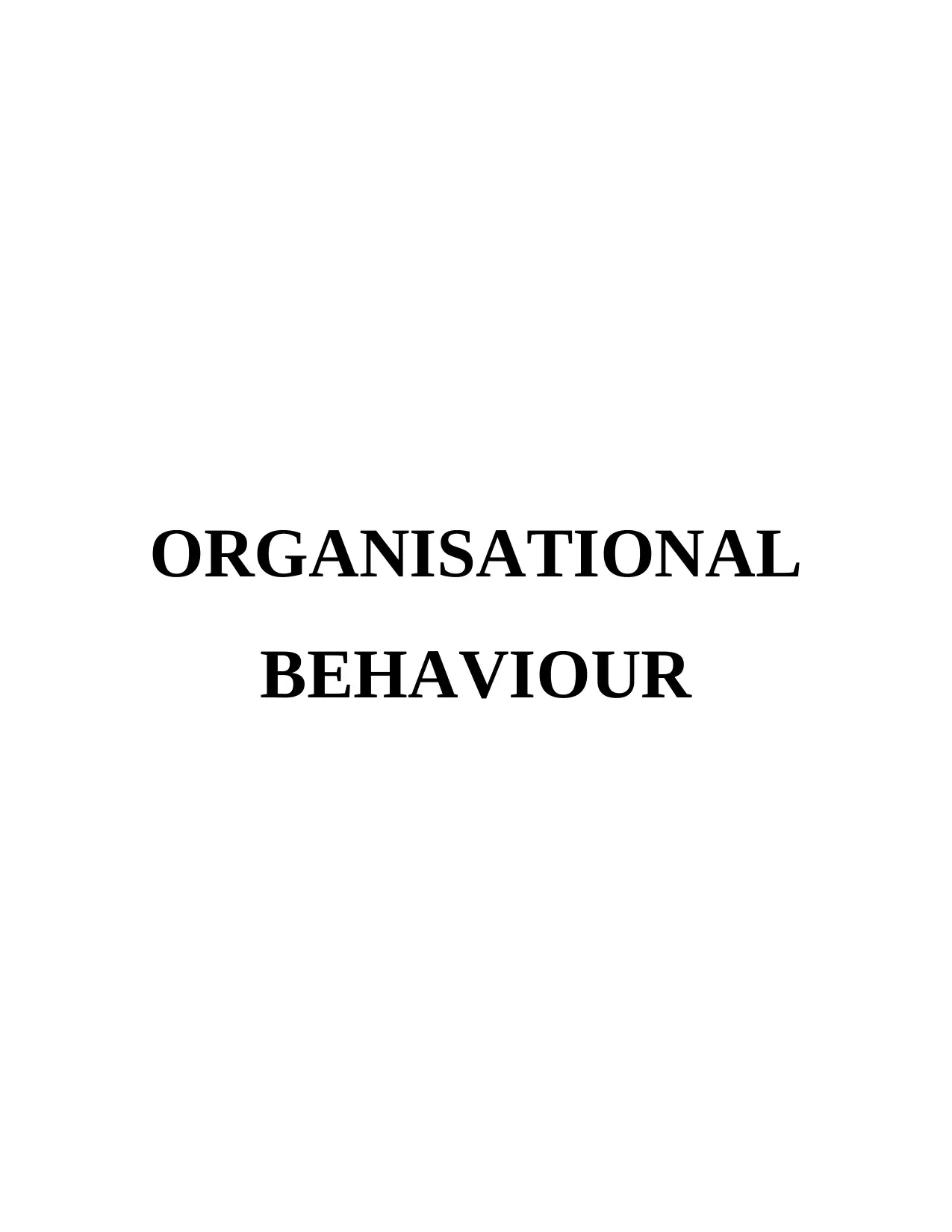
ORGANISATIONAL
BEHAVIOUR
BEHAVIOUR
Paraphrase This Document
Need a fresh take? Get an instant paraphrase of this document with our AI Paraphraser
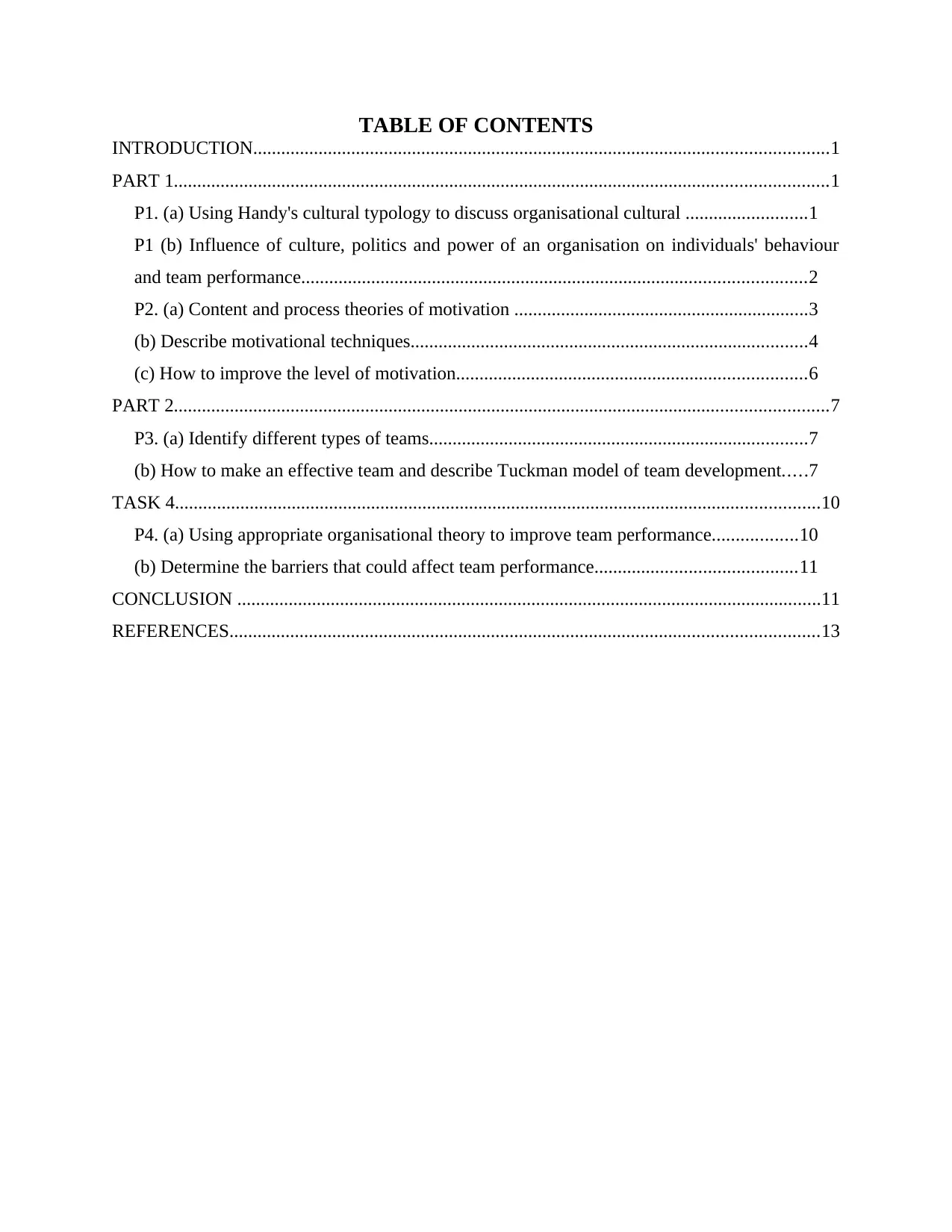
TABLE OF CONTENTS
INTRODUCTION...........................................................................................................................1
PART 1............................................................................................................................................1
P1. (a) Using Handy's cultural typology to discuss organisational cultural ..........................1
P1 (b) Influence of culture, politics and power of an organisation on individuals' behaviour
and team performance............................................................................................................2
P2. (a) Content and process theories of motivation ...............................................................3
(b) Describe motivational techniques.....................................................................................4
(c) How to improve the level of motivation...........................................................................6
PART 2............................................................................................................................................7
P3. (a) Identify different types of teams.................................................................................7
(b) How to make an effective team and describe Tuckman model of team development.....7
TASK 4..........................................................................................................................................10
P4. (a) Using appropriate organisational theory to improve team performance..................10
(b) Determine the barriers that could affect team performance...........................................11
CONCLUSION .............................................................................................................................11
REFERENCES..............................................................................................................................13
INTRODUCTION...........................................................................................................................1
PART 1............................................................................................................................................1
P1. (a) Using Handy's cultural typology to discuss organisational cultural ..........................1
P1 (b) Influence of culture, politics and power of an organisation on individuals' behaviour
and team performance............................................................................................................2
P2. (a) Content and process theories of motivation ...............................................................3
(b) Describe motivational techniques.....................................................................................4
(c) How to improve the level of motivation...........................................................................6
PART 2............................................................................................................................................7
P3. (a) Identify different types of teams.................................................................................7
(b) How to make an effective team and describe Tuckman model of team development.....7
TASK 4..........................................................................................................................................10
P4. (a) Using appropriate organisational theory to improve team performance..................10
(b) Determine the barriers that could affect team performance...........................................11
CONCLUSION .............................................................................................................................11
REFERENCES..............................................................................................................................13
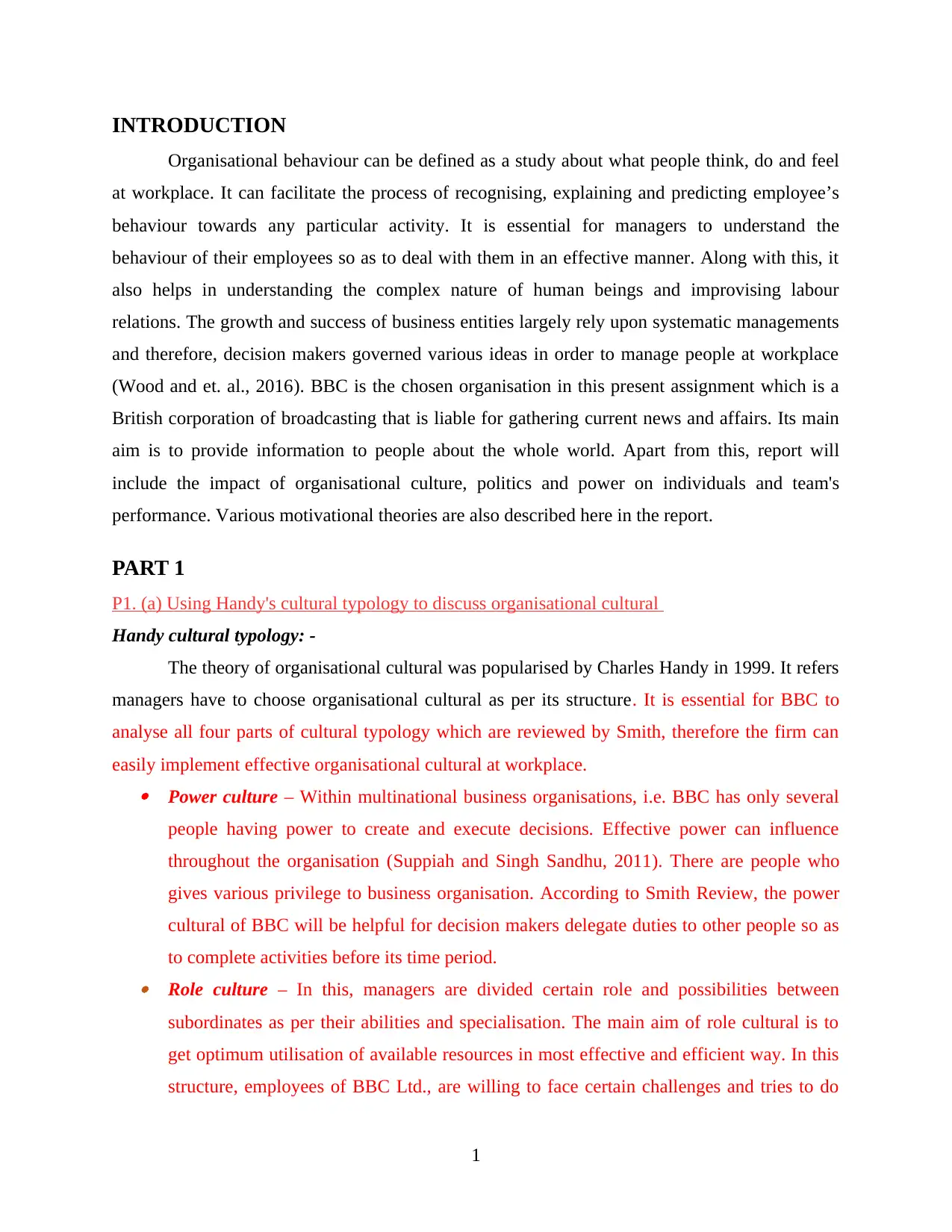
INTRODUCTION
Organisational behaviour can be defined as a study about what people think, do and feel
at workplace. It can facilitate the process of recognising, explaining and predicting employee’s
behaviour towards any particular activity. It is essential for managers to understand the
behaviour of their employees so as to deal with them in an effective manner. Along with this, it
also helps in understanding the complex nature of human beings and improvising labour
relations. The growth and success of business entities largely rely upon systematic managements
and therefore, decision makers governed various ideas in order to manage people at workplace
(Wood and et. al., 2016). BBC is the chosen organisation in this present assignment which is a
British corporation of broadcasting that is liable for gathering current news and affairs. Its main
aim is to provide information to people about the whole world. Apart from this, report will
include the impact of organisational culture, politics and power on individuals and team's
performance. Various motivational theories are also described here in the report.
PART 1
P1. (a) Using Handy's cultural typology to discuss organisational cultural
Handy cultural typology: -
The theory of organisational cultural was popularised by Charles Handy in 1999. It refers
managers have to choose organisational cultural as per its structure. It is essential for BBC to
analyse all four parts of cultural typology which are reviewed by Smith, therefore the firm can
easily implement effective organisational cultural at workplace. Power culture – Within multinational business organisations, i.e. BBC has only several
people having power to create and execute decisions. Effective power can influence
throughout the organisation (Suppiah and Singh Sandhu, 2011). There are people who
gives various privilege to business organisation. According to Smith Review, the power
cultural of BBC will be helpful for decision makers delegate duties to other people so as
to complete activities before its time period. Role culture – In this, managers are divided certain role and possibilities between
subordinates as per their abilities and specialisation. The main aim of role cultural is to
get optimum utilisation of available resources in most effective and efficient way. In this
structure, employees of BBC Ltd., are willing to face certain challenges and tries to do
1
Organisational behaviour can be defined as a study about what people think, do and feel
at workplace. It can facilitate the process of recognising, explaining and predicting employee’s
behaviour towards any particular activity. It is essential for managers to understand the
behaviour of their employees so as to deal with them in an effective manner. Along with this, it
also helps in understanding the complex nature of human beings and improvising labour
relations. The growth and success of business entities largely rely upon systematic managements
and therefore, decision makers governed various ideas in order to manage people at workplace
(Wood and et. al., 2016). BBC is the chosen organisation in this present assignment which is a
British corporation of broadcasting that is liable for gathering current news and affairs. Its main
aim is to provide information to people about the whole world. Apart from this, report will
include the impact of organisational culture, politics and power on individuals and team's
performance. Various motivational theories are also described here in the report.
PART 1
P1. (a) Using Handy's cultural typology to discuss organisational cultural
Handy cultural typology: -
The theory of organisational cultural was popularised by Charles Handy in 1999. It refers
managers have to choose organisational cultural as per its structure. It is essential for BBC to
analyse all four parts of cultural typology which are reviewed by Smith, therefore the firm can
easily implement effective organisational cultural at workplace. Power culture – Within multinational business organisations, i.e. BBC has only several
people having power to create and execute decisions. Effective power can influence
throughout the organisation (Suppiah and Singh Sandhu, 2011). There are people who
gives various privilege to business organisation. According to Smith Review, the power
cultural of BBC will be helpful for decision makers delegate duties to other people so as
to complete activities before its time period. Role culture – In this, managers are divided certain role and possibilities between
subordinates as per their abilities and specialisation. The main aim of role cultural is to
get optimum utilisation of available resources in most effective and efficient way. In this
structure, employees of BBC Ltd., are willing to face certain challenges and tries to do
1
⊘ This is a preview!⊘
Do you want full access?
Subscribe today to unlock all pages.

Trusted by 1+ million students worldwide
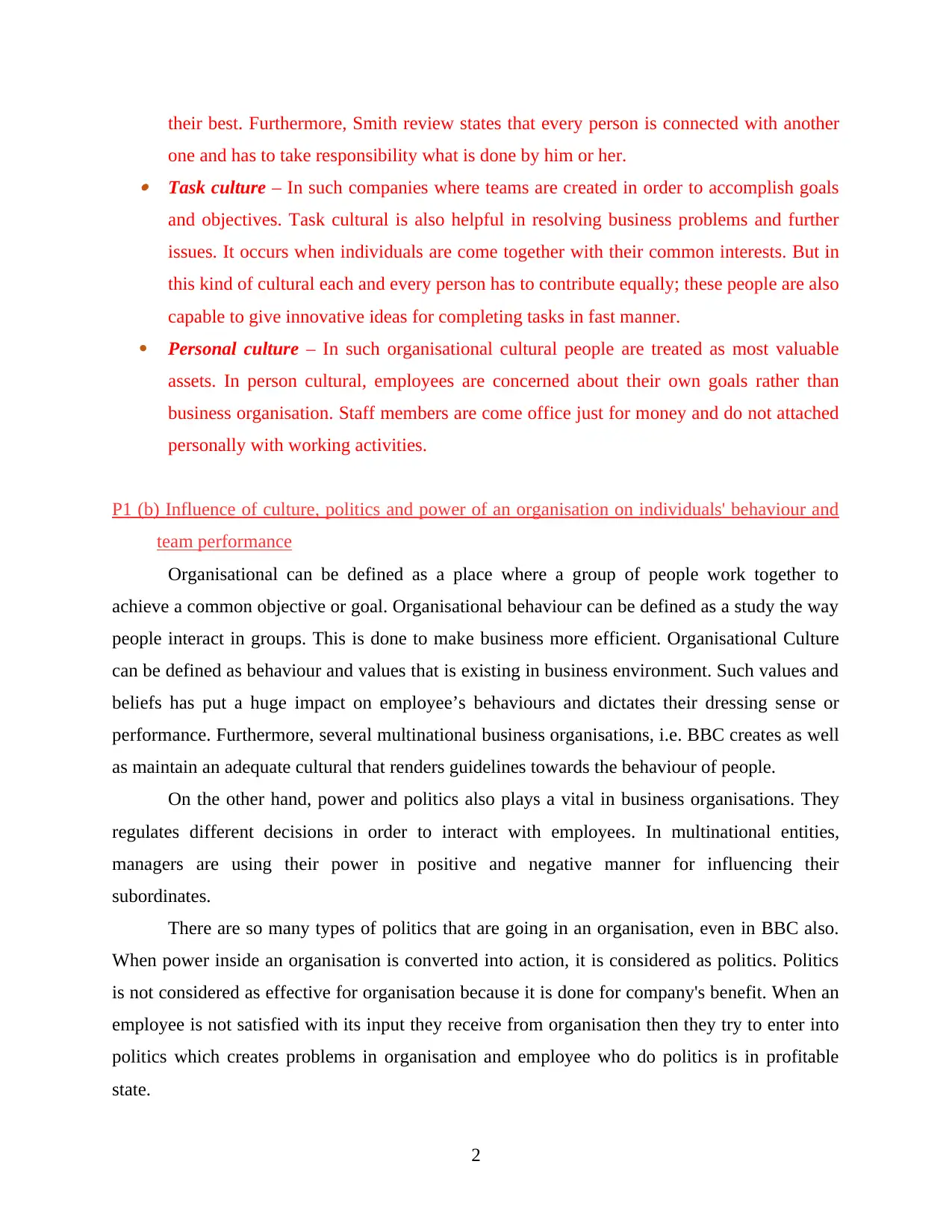
their best. Furthermore, Smith review states that every person is connected with another
one and has to take responsibility what is done by him or her. Task culture – In such companies where teams are created in order to accomplish goals
and objectives. Task cultural is also helpful in resolving business problems and further
issues. It occurs when individuals are come together with their common interests. But in
this kind of cultural each and every person has to contribute equally; these people are also
capable to give innovative ideas for completing tasks in fast manner.
Personal culture – In such organisational cultural people are treated as most valuable
assets. In person cultural, employees are concerned about their own goals rather than
business organisation. Staff members are come office just for money and do not attached
personally with working activities.
P1 (b) Influence of culture, politics and power of an organisation on individuals' behaviour and
team performance
Organisational can be defined as a place where a group of people work together to
achieve a common objective or goal. Organisational behaviour can be defined as a study the way
people interact in groups. This is done to make business more efficient. Organisational Culture
can be defined as behaviour and values that is existing in business environment. Such values and
beliefs has put a huge impact on employee’s behaviours and dictates their dressing sense or
performance. Furthermore, several multinational business organisations, i.e. BBC creates as well
as maintain an adequate cultural that renders guidelines towards the behaviour of people.
On the other hand, power and politics also plays a vital in business organisations. They
regulates different decisions in order to interact with employees. In multinational entities,
managers are using their power in positive and negative manner for influencing their
subordinates.
There are so many types of politics that are going in an organisation, even in BBC also.
When power inside an organisation is converted into action, it is considered as politics. Politics
is not considered as effective for organisation because it is done for company's benefit. When an
employee is not satisfied with its input they receive from organisation then they try to enter into
politics which creates problems in organisation and employee who do politics is in profitable
state.
2
one and has to take responsibility what is done by him or her. Task culture – In such companies where teams are created in order to accomplish goals
and objectives. Task cultural is also helpful in resolving business problems and further
issues. It occurs when individuals are come together with their common interests. But in
this kind of cultural each and every person has to contribute equally; these people are also
capable to give innovative ideas for completing tasks in fast manner.
Personal culture – In such organisational cultural people are treated as most valuable
assets. In person cultural, employees are concerned about their own goals rather than
business organisation. Staff members are come office just for money and do not attached
personally with working activities.
P1 (b) Influence of culture, politics and power of an organisation on individuals' behaviour and
team performance
Organisational can be defined as a place where a group of people work together to
achieve a common objective or goal. Organisational behaviour can be defined as a study the way
people interact in groups. This is done to make business more efficient. Organisational Culture
can be defined as behaviour and values that is existing in business environment. Such values and
beliefs has put a huge impact on employee’s behaviours and dictates their dressing sense or
performance. Furthermore, several multinational business organisations, i.e. BBC creates as well
as maintain an adequate cultural that renders guidelines towards the behaviour of people.
On the other hand, power and politics also plays a vital in business organisations. They
regulates different decisions in order to interact with employees. In multinational entities,
managers are using their power in positive and negative manner for influencing their
subordinates.
There are so many types of politics that are going in an organisation, even in BBC also.
When power inside an organisation is converted into action, it is considered as politics. Politics
is not considered as effective for organisation because it is done for company's benefit. When an
employee is not satisfied with its input they receive from organisation then they try to enter into
politics which creates problems in organisation and employee who do politics is in profitable
state.
2
Paraphrase This Document
Need a fresh take? Get an instant paraphrase of this document with our AI Paraphraser
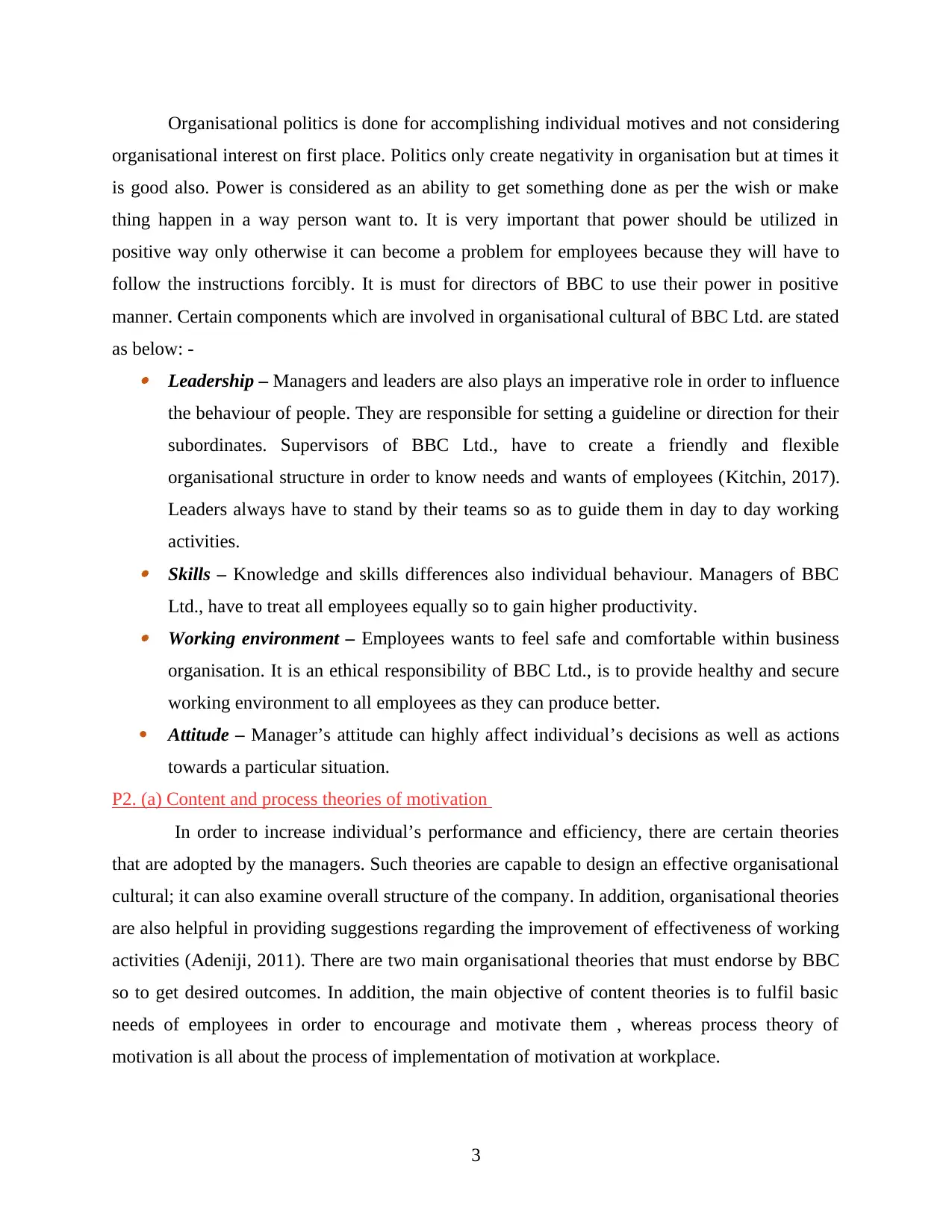
Organisational politics is done for accomplishing individual motives and not considering
organisational interest on first place. Politics only create negativity in organisation but at times it
is good also. Power is considered as an ability to get something done as per the wish or make
thing happen in a way person want to. It is very important that power should be utilized in
positive way only otherwise it can become a problem for employees because they will have to
follow the instructions forcibly. It is must for directors of BBC to use their power in positive
manner. Certain components which are involved in organisational cultural of BBC Ltd. are stated
as below: - Leadership – Managers and leaders are also plays an imperative role in order to influence
the behaviour of people. They are responsible for setting a guideline or direction for their
subordinates. Supervisors of BBC Ltd., have to create a friendly and flexible
organisational structure in order to know needs and wants of employees (Kitchin, 2017).
Leaders always have to stand by their teams so as to guide them in day to day working
activities. Skills – Knowledge and skills differences also individual behaviour. Managers of BBC
Ltd., have to treat all employees equally so to gain higher productivity. Working environment – Employees wants to feel safe and comfortable within business
organisation. It is an ethical responsibility of BBC Ltd., is to provide healthy and secure
working environment to all employees as they can produce better.
Attitude – Manager’s attitude can highly affect individual’s decisions as well as actions
towards a particular situation.
P2. (a) Content and process theories of motivation
In order to increase individual’s performance and efficiency, there are certain theories
that are adopted by the managers. Such theories are capable to design an effective organisational
cultural; it can also examine overall structure of the company. In addition, organisational theories
are also helpful in providing suggestions regarding the improvement of effectiveness of working
activities (Adeniji, 2011). There are two main organisational theories that must endorse by BBC
so to get desired outcomes. In addition, the main objective of content theories is to fulfil basic
needs of employees in order to encourage and motivate them , whereas process theory of
motivation is all about the process of implementation of motivation at workplace.
3
organisational interest on first place. Politics only create negativity in organisation but at times it
is good also. Power is considered as an ability to get something done as per the wish or make
thing happen in a way person want to. It is very important that power should be utilized in
positive way only otherwise it can become a problem for employees because they will have to
follow the instructions forcibly. It is must for directors of BBC to use their power in positive
manner. Certain components which are involved in organisational cultural of BBC Ltd. are stated
as below: - Leadership – Managers and leaders are also plays an imperative role in order to influence
the behaviour of people. They are responsible for setting a guideline or direction for their
subordinates. Supervisors of BBC Ltd., have to create a friendly and flexible
organisational structure in order to know needs and wants of employees (Kitchin, 2017).
Leaders always have to stand by their teams so as to guide them in day to day working
activities. Skills – Knowledge and skills differences also individual behaviour. Managers of BBC
Ltd., have to treat all employees equally so to gain higher productivity. Working environment – Employees wants to feel safe and comfortable within business
organisation. It is an ethical responsibility of BBC Ltd., is to provide healthy and secure
working environment to all employees as they can produce better.
Attitude – Manager’s attitude can highly affect individual’s decisions as well as actions
towards a particular situation.
P2. (a) Content and process theories of motivation
In order to increase individual’s performance and efficiency, there are certain theories
that are adopted by the managers. Such theories are capable to design an effective organisational
cultural; it can also examine overall structure of the company. In addition, organisational theories
are also helpful in providing suggestions regarding the improvement of effectiveness of working
activities (Adeniji, 2011). There are two main organisational theories that must endorse by BBC
so to get desired outcomes. In addition, the main objective of content theories is to fulfil basic
needs of employees in order to encourage and motivate them , whereas process theory of
motivation is all about the process of implementation of motivation at workplace.
3
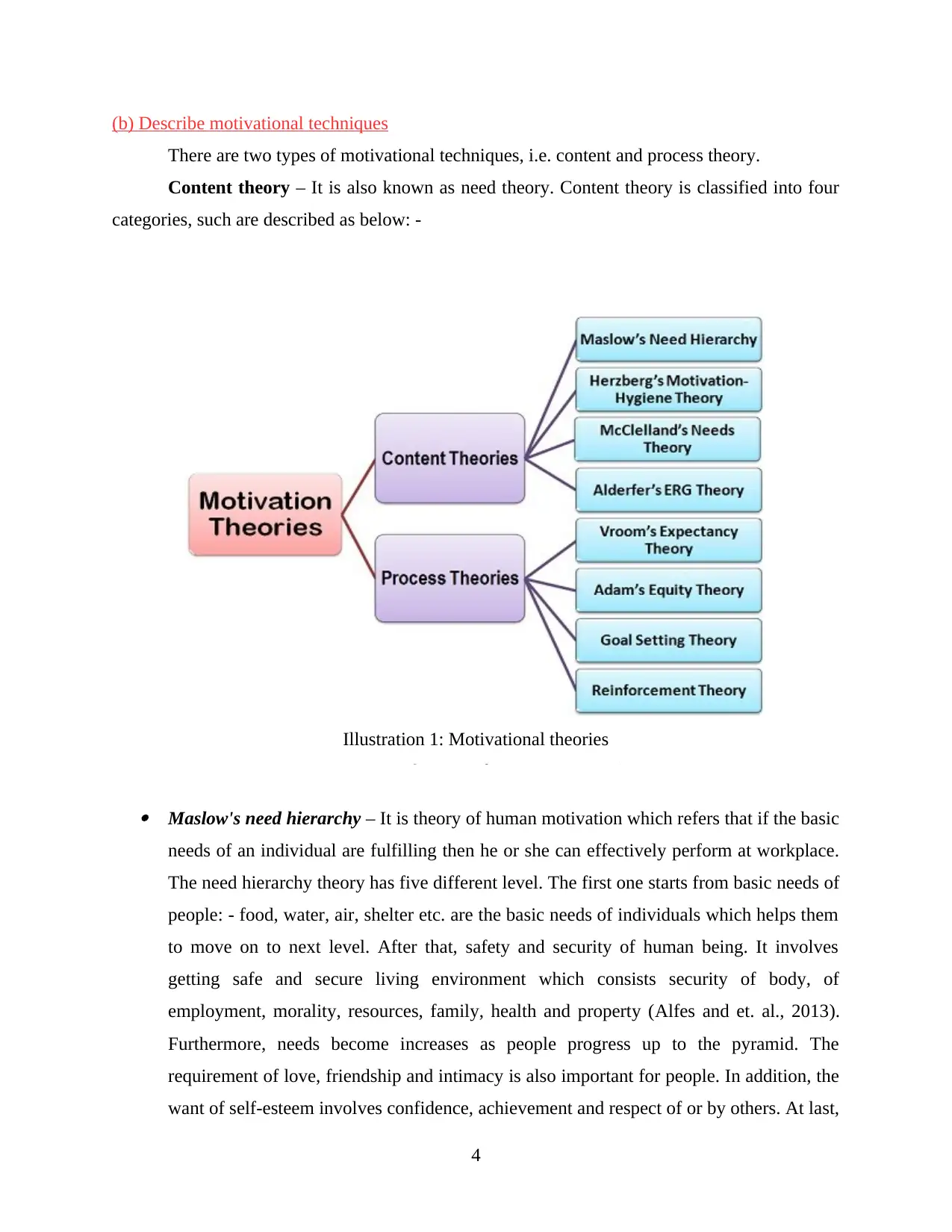
(b) Describe motivational techniques
There are two types of motivational techniques, i.e. content and process theory.
Content theory – It is also known as need theory. Content theory is classified into four
categories, such are described as below: -
Maslow's need hierarchy – It is theory of human motivation which refers that if the basic
needs of an individual are fulfilling then he or she can effectively perform at workplace.
The need hierarchy theory has five different level. The first one starts from basic needs of
people: - food, water, air, shelter etc. are the basic needs of individuals which helps them
to move on to next level. After that, safety and security of human being. It involves
getting safe and secure living environment which consists security of body, of
employment, morality, resources, family, health and property (Alfes and et. al., 2013).
Furthermore, needs become increases as people progress up to the pyramid. The
requirement of love, friendship and intimacy is also important for people. In addition, the
want of self-esteem involves confidence, achievement and respect of or by others. At last,
4
Illustration 1: Motivational theories
(Sources: Theories of Motivation, 2017)
There are two types of motivational techniques, i.e. content and process theory.
Content theory – It is also known as need theory. Content theory is classified into four
categories, such are described as below: -
Maslow's need hierarchy – It is theory of human motivation which refers that if the basic
needs of an individual are fulfilling then he or she can effectively perform at workplace.
The need hierarchy theory has five different level. The first one starts from basic needs of
people: - food, water, air, shelter etc. are the basic needs of individuals which helps them
to move on to next level. After that, safety and security of human being. It involves
getting safe and secure living environment which consists security of body, of
employment, morality, resources, family, health and property (Alfes and et. al., 2013).
Furthermore, needs become increases as people progress up to the pyramid. The
requirement of love, friendship and intimacy is also important for people. In addition, the
want of self-esteem involves confidence, achievement and respect of or by others. At last,
4
Illustration 1: Motivational theories
(Sources: Theories of Motivation, 2017)
⊘ This is a preview!⊘
Do you want full access?
Subscribe today to unlock all pages.

Trusted by 1+ million students worldwide
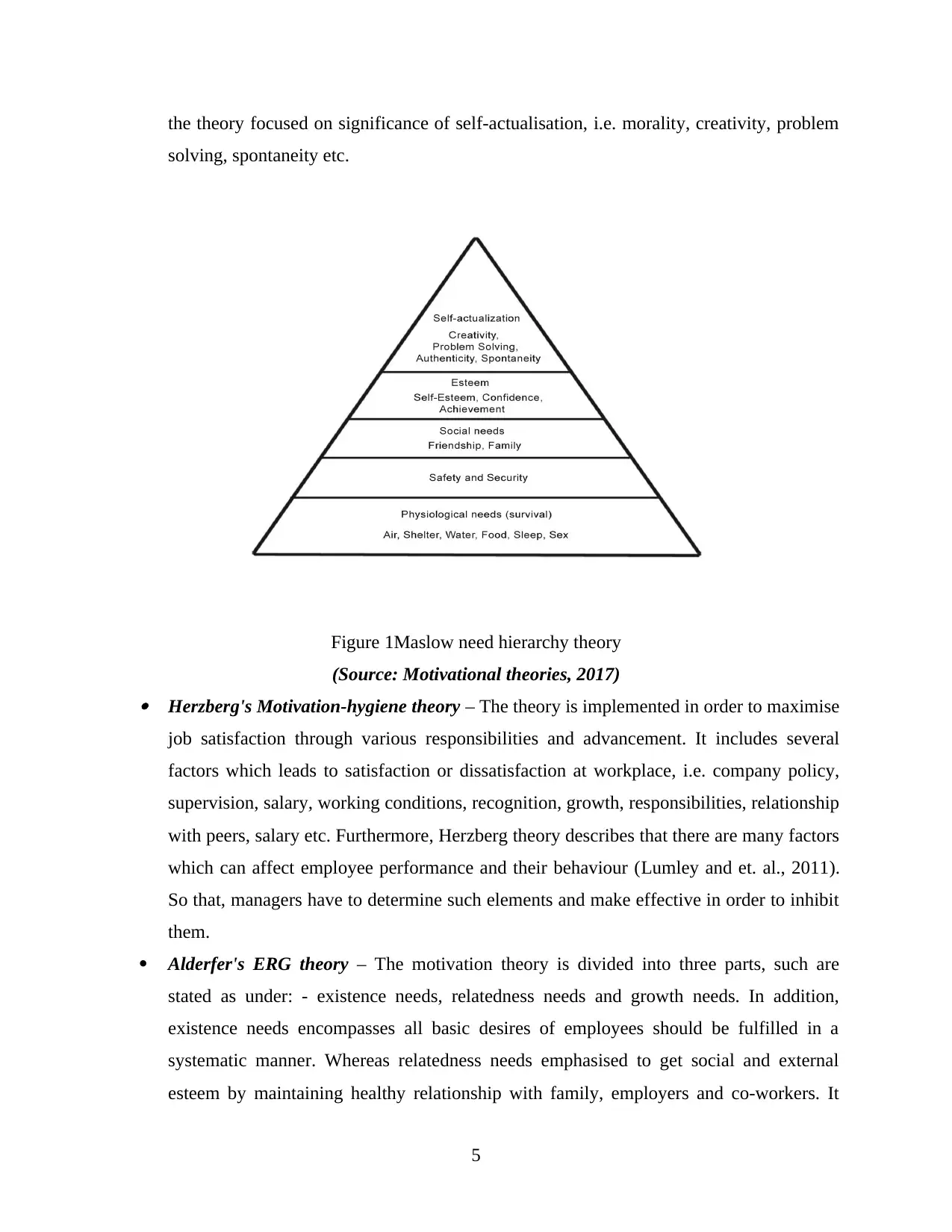
the theory focused on significance of self-actualisation, i.e. morality, creativity, problem
solving, spontaneity etc.
Figure 1Maslow need hierarchy theory
(Source: Motivational theories, 2017) Herzberg's Motivation-hygiene theory – The theory is implemented in order to maximise
job satisfaction through various responsibilities and advancement. It includes several
factors which leads to satisfaction or dissatisfaction at workplace, i.e. company policy,
supervision, salary, working conditions, recognition, growth, responsibilities, relationship
with peers, salary etc. Furthermore, Herzberg theory describes that there are many factors
which can affect employee performance and their behaviour (Lumley and et. al., 2011).
So that, managers have to determine such elements and make effective in order to inhibit
them.
Alderfer's ERG theory – The motivation theory is divided into three parts, such are
stated as under: - existence needs, relatedness needs and growth needs. In addition,
existence needs encompasses all basic desires of employees should be fulfilled in a
systematic manner. Whereas relatedness needs emphasised to get social and external
esteem by maintaining healthy relationship with family, employers and co-workers. It
5
solving, spontaneity etc.
Figure 1Maslow need hierarchy theory
(Source: Motivational theories, 2017) Herzberg's Motivation-hygiene theory – The theory is implemented in order to maximise
job satisfaction through various responsibilities and advancement. It includes several
factors which leads to satisfaction or dissatisfaction at workplace, i.e. company policy,
supervision, salary, working conditions, recognition, growth, responsibilities, relationship
with peers, salary etc. Furthermore, Herzberg theory describes that there are many factors
which can affect employee performance and their behaviour (Lumley and et. al., 2011).
So that, managers have to determine such elements and make effective in order to inhibit
them.
Alderfer's ERG theory – The motivation theory is divided into three parts, such are
stated as under: - existence needs, relatedness needs and growth needs. In addition,
existence needs encompasses all basic desires of employees should be fulfilled in a
systematic manner. Whereas relatedness needs emphasised to get social and external
esteem by maintaining healthy relationship with family, employers and co-workers. It
5
Paraphrase This Document
Need a fresh take? Get an instant paraphrase of this document with our AI Paraphraser
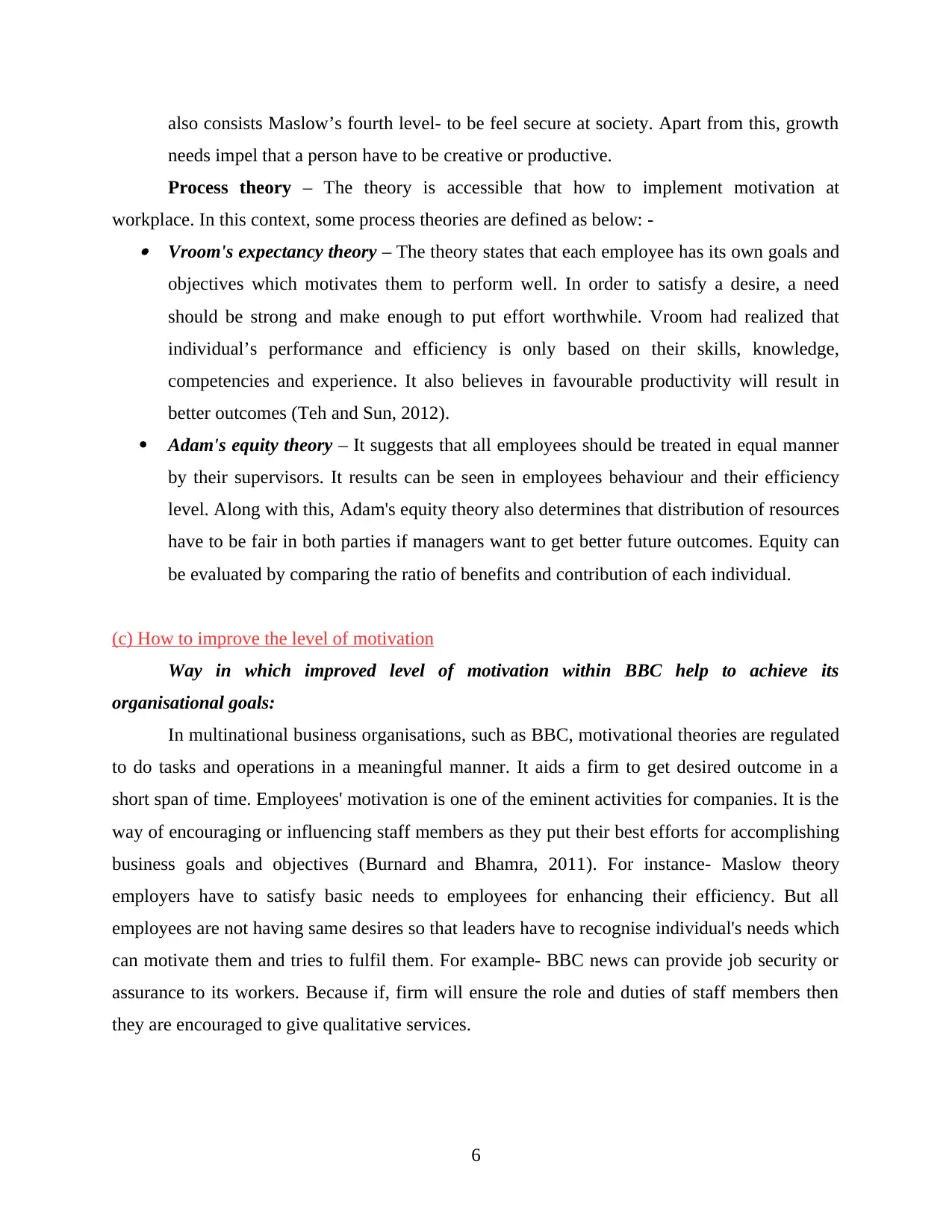
also consists Maslow’s fourth level- to be feel secure at society. Apart from this, growth
needs impel that a person have to be creative or productive.
Process theory – The theory is accessible that how to implement motivation at
workplace. In this context, some process theories are defined as below: - Vroom's expectancy theory – The theory states that each employee has its own goals and
objectives which motivates them to perform well. In order to satisfy a desire, a need
should be strong and make enough to put effort worthwhile. Vroom had realized that
individual’s performance and efficiency is only based on their skills, knowledge,
competencies and experience. It also believes in favourable productivity will result in
better outcomes (Teh and Sun, 2012).
Adam's equity theory – It suggests that all employees should be treated in equal manner
by their supervisors. It results can be seen in employees behaviour and their efficiency
level. Along with this, Adam's equity theory also determines that distribution of resources
have to be fair in both parties if managers want to get better future outcomes. Equity can
be evaluated by comparing the ratio of benefits and contribution of each individual.
(c) How to improve the level of motivation
Way in which improved level of motivation within BBC help to achieve its
organisational goals:
In multinational business organisations, such as BBC, motivational theories are regulated
to do tasks and operations in a meaningful manner. It aids a firm to get desired outcome in a
short span of time. Employees' motivation is one of the eminent activities for companies. It is the
way of encouraging or influencing staff members as they put their best efforts for accomplishing
business goals and objectives (Burnard and Bhamra, 2011). For instance- Maslow theory
employers have to satisfy basic needs to employees for enhancing their efficiency. But all
employees are not having same desires so that leaders have to recognise individual's needs which
can motivate them and tries to fulfil them. For example- BBC news can provide job security or
assurance to its workers. Because if, firm will ensure the role and duties of staff members then
they are encouraged to give qualitative services.
6
needs impel that a person have to be creative or productive.
Process theory – The theory is accessible that how to implement motivation at
workplace. In this context, some process theories are defined as below: - Vroom's expectancy theory – The theory states that each employee has its own goals and
objectives which motivates them to perform well. In order to satisfy a desire, a need
should be strong and make enough to put effort worthwhile. Vroom had realized that
individual’s performance and efficiency is only based on their skills, knowledge,
competencies and experience. It also believes in favourable productivity will result in
better outcomes (Teh and Sun, 2012).
Adam's equity theory – It suggests that all employees should be treated in equal manner
by their supervisors. It results can be seen in employees behaviour and their efficiency
level. Along with this, Adam's equity theory also determines that distribution of resources
have to be fair in both parties if managers want to get better future outcomes. Equity can
be evaluated by comparing the ratio of benefits and contribution of each individual.
(c) How to improve the level of motivation
Way in which improved level of motivation within BBC help to achieve its
organisational goals:
In multinational business organisations, such as BBC, motivational theories are regulated
to do tasks and operations in a meaningful manner. It aids a firm to get desired outcome in a
short span of time. Employees' motivation is one of the eminent activities for companies. It is the
way of encouraging or influencing staff members as they put their best efforts for accomplishing
business goals and objectives (Burnard and Bhamra, 2011). For instance- Maslow theory
employers have to satisfy basic needs to employees for enhancing their efficiency. But all
employees are not having same desires so that leaders have to recognise individual's needs which
can motivate them and tries to fulfil them. For example- BBC news can provide job security or
assurance to its workers. Because if, firm will ensure the role and duties of staff members then
they are encouraged to give qualitative services.
6
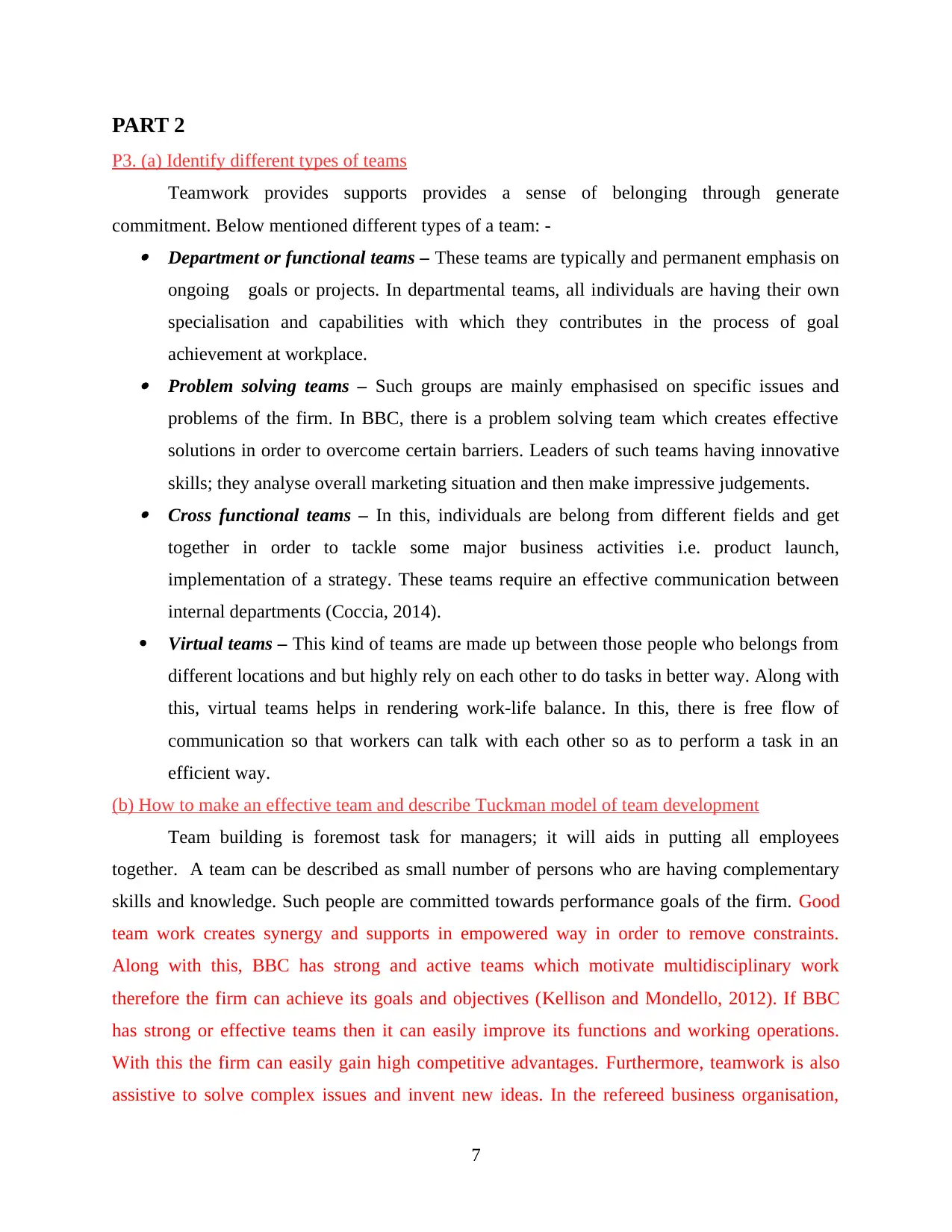
PART 2
P3. (a) Identify different types of teams
Teamwork provides supports provides a sense of belonging through generate
commitment. Below mentioned different types of a team: - Department or functional teams – These teams are typically and permanent emphasis on
ongoing goals or projects. In departmental teams, all individuals are having their own
specialisation and capabilities with which they contributes in the process of goal
achievement at workplace. Problem solving teams – Such groups are mainly emphasised on specific issues and
problems of the firm. In BBC, there is a problem solving team which creates effective
solutions in order to overcome certain barriers. Leaders of such teams having innovative
skills; they analyse overall marketing situation and then make impressive judgements. Cross functional teams – In this, individuals are belong from different fields and get
together in order to tackle some major business activities i.e. product launch,
implementation of a strategy. These teams require an effective communication between
internal departments (Coccia, 2014).
Virtual teams – This kind of teams are made up between those people who belongs from
different locations and but highly rely on each other to do tasks in better way. Along with
this, virtual teams helps in rendering work-life balance. In this, there is free flow of
communication so that workers can talk with each other so as to perform a task in an
efficient way.
(b) How to make an effective team and describe Tuckman model of team development
Team building is foremost task for managers; it will aids in putting all employees
together. A team can be described as small number of persons who are having complementary
skills and knowledge. Such people are committed towards performance goals of the firm. Good
team work creates synergy and supports in empowered way in order to remove constraints.
Along with this, BBC has strong and active teams which motivate multidisciplinary work
therefore the firm can achieve its goals and objectives (Kellison and Mondello, 2012). If BBC
has strong or effective teams then it can easily improve its functions and working operations.
With this the firm can easily gain high competitive advantages. Furthermore, teamwork is also
assistive to solve complex issues and invent new ideas. In the refereed business organisation,
7
P3. (a) Identify different types of teams
Teamwork provides supports provides a sense of belonging through generate
commitment. Below mentioned different types of a team: - Department or functional teams – These teams are typically and permanent emphasis on
ongoing goals or projects. In departmental teams, all individuals are having their own
specialisation and capabilities with which they contributes in the process of goal
achievement at workplace. Problem solving teams – Such groups are mainly emphasised on specific issues and
problems of the firm. In BBC, there is a problem solving team which creates effective
solutions in order to overcome certain barriers. Leaders of such teams having innovative
skills; they analyse overall marketing situation and then make impressive judgements. Cross functional teams – In this, individuals are belong from different fields and get
together in order to tackle some major business activities i.e. product launch,
implementation of a strategy. These teams require an effective communication between
internal departments (Coccia, 2014).
Virtual teams – This kind of teams are made up between those people who belongs from
different locations and but highly rely on each other to do tasks in better way. Along with
this, virtual teams helps in rendering work-life balance. In this, there is free flow of
communication so that workers can talk with each other so as to perform a task in an
efficient way.
(b) How to make an effective team and describe Tuckman model of team development
Team building is foremost task for managers; it will aids in putting all employees
together. A team can be described as small number of persons who are having complementary
skills and knowledge. Such people are committed towards performance goals of the firm. Good
team work creates synergy and supports in empowered way in order to remove constraints.
Along with this, BBC has strong and active teams which motivate multidisciplinary work
therefore the firm can achieve its goals and objectives (Kellison and Mondello, 2012). If BBC
has strong or effective teams then it can easily improve its functions and working operations.
With this the firm can easily gain high competitive advantages. Furthermore, teamwork is also
assistive to solve complex issues and invent new ideas. In the refereed business organisation,
7
⊘ This is a preview!⊘
Do you want full access?
Subscribe today to unlock all pages.

Trusted by 1+ million students worldwide
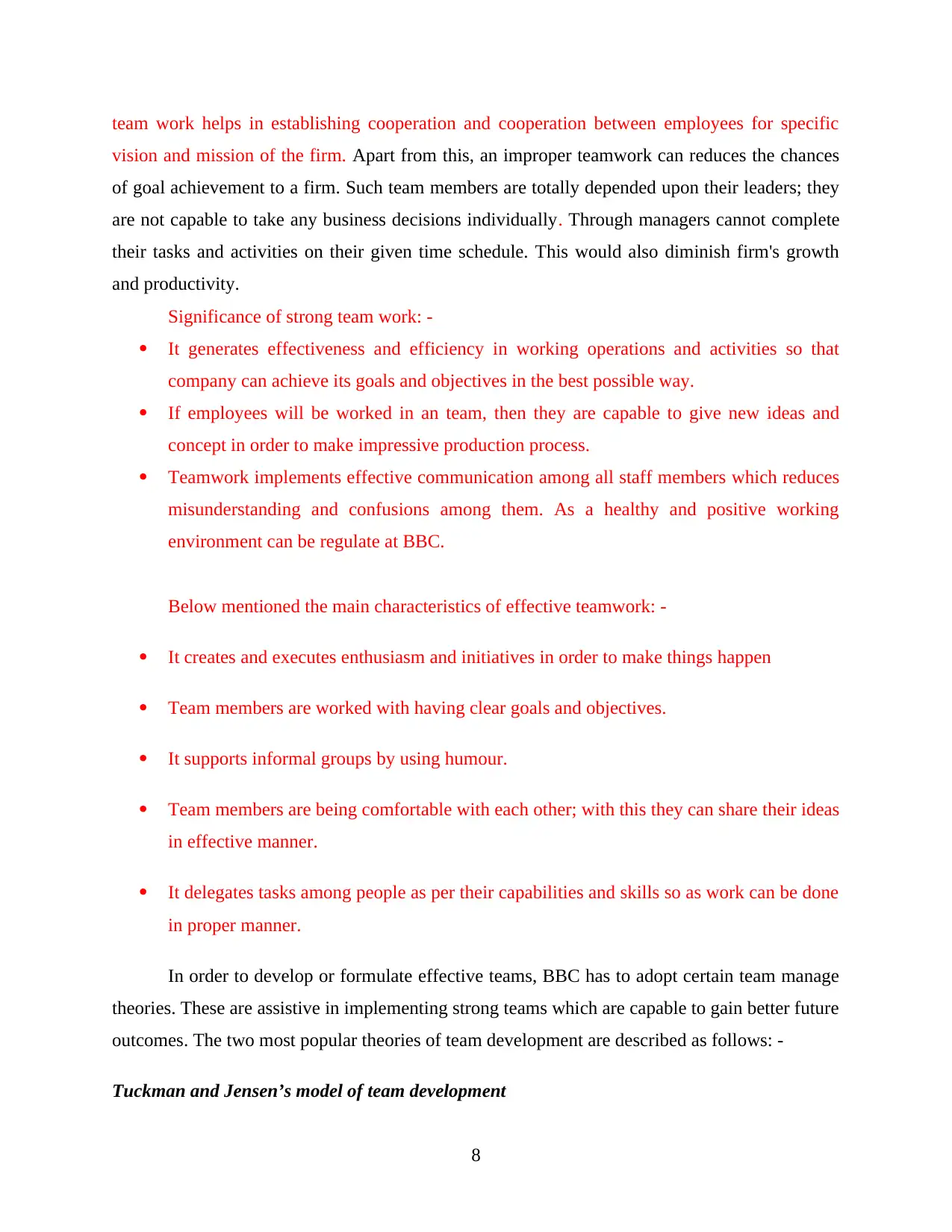
team work helps in establishing cooperation and cooperation between employees for specific
vision and mission of the firm. Apart from this, an improper teamwork can reduces the chances
of goal achievement to a firm. Such team members are totally depended upon their leaders; they
are not capable to take any business decisions individually. Through managers cannot complete
their tasks and activities on their given time schedule. This would also diminish firm's growth
and productivity.
Significance of strong team work: -
It generates effectiveness and efficiency in working operations and activities so that
company can achieve its goals and objectives in the best possible way.
If employees will be worked in an team, then they are capable to give new ideas and
concept in order to make impressive production process.
Teamwork implements effective communication among all staff members which reduces
misunderstanding and confusions among them. As a healthy and positive working
environment can be regulate at BBC.
Below mentioned the main characteristics of effective teamwork: -
It creates and executes enthusiasm and initiatives in order to make things happen
Team members are worked with having clear goals and objectives.
It supports informal groups by using humour.
Team members are being comfortable with each other; with this they can share their ideas
in effective manner.
It delegates tasks among people as per their capabilities and skills so as work can be done
in proper manner.
In order to develop or formulate effective teams, BBC has to adopt certain team manage
theories. These are assistive in implementing strong teams which are capable to gain better future
outcomes. The two most popular theories of team development are described as follows: -
Tuckman and Jensen’s model of team development
8
vision and mission of the firm. Apart from this, an improper teamwork can reduces the chances
of goal achievement to a firm. Such team members are totally depended upon their leaders; they
are not capable to take any business decisions individually. Through managers cannot complete
their tasks and activities on their given time schedule. This would also diminish firm's growth
and productivity.
Significance of strong team work: -
It generates effectiveness and efficiency in working operations and activities so that
company can achieve its goals and objectives in the best possible way.
If employees will be worked in an team, then they are capable to give new ideas and
concept in order to make impressive production process.
Teamwork implements effective communication among all staff members which reduces
misunderstanding and confusions among them. As a healthy and positive working
environment can be regulate at BBC.
Below mentioned the main characteristics of effective teamwork: -
It creates and executes enthusiasm and initiatives in order to make things happen
Team members are worked with having clear goals and objectives.
It supports informal groups by using humour.
Team members are being comfortable with each other; with this they can share their ideas
in effective manner.
It delegates tasks among people as per their capabilities and skills so as work can be done
in proper manner.
In order to develop or formulate effective teams, BBC has to adopt certain team manage
theories. These are assistive in implementing strong teams which are capable to gain better future
outcomes. The two most popular theories of team development are described as follows: -
Tuckman and Jensen’s model of team development
8
Paraphrase This Document
Need a fresh take? Get an instant paraphrase of this document with our AI Paraphraser
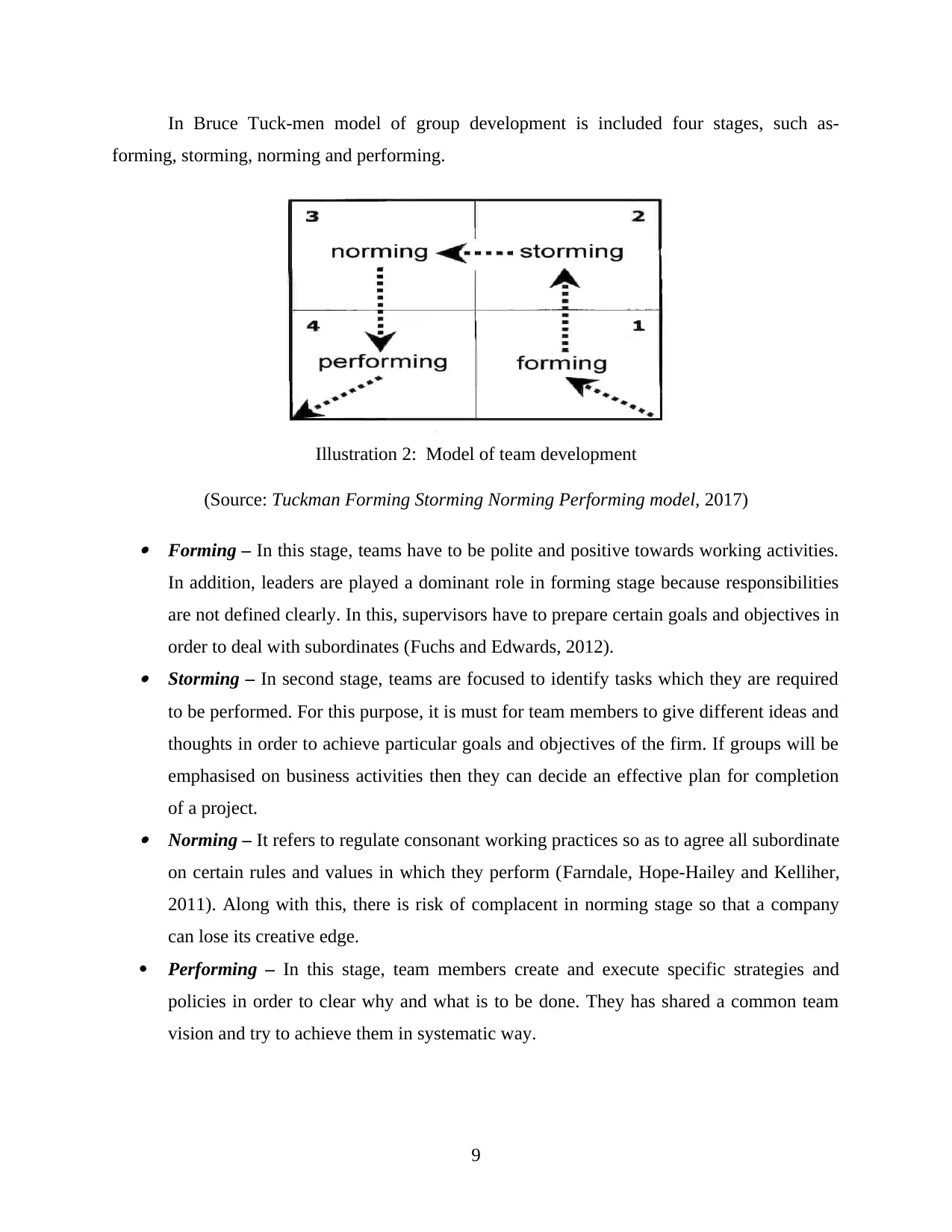
In Bruce Tuck-men model of group development is included four stages, such as-
forming, storming, norming and performing.
(Source: Tuckman Forming Storming Norming Performing model, 2017)
Forming – In this stage, teams have to be polite and positive towards working activities.
In addition, leaders are played a dominant role in forming stage because responsibilities
are not defined clearly. In this, supervisors have to prepare certain goals and objectives in
order to deal with subordinates (Fuchs and Edwards, 2012). Storming – In second stage, teams are focused to identify tasks which they are required
to be performed. For this purpose, it is must for team members to give different ideas and
thoughts in order to achieve particular goals and objectives of the firm. If groups will be
emphasised on business activities then they can decide an effective plan for completion
of a project. Norming – It refers to regulate consonant working practices so as to agree all subordinate
on certain rules and values in which they perform (Farndale, Hope-Hailey and Kelliher,
2011). Along with this, there is risk of complacent in norming stage so that a company
can lose its creative edge.
Performing – In this stage, team members create and execute specific strategies and
policies in order to clear why and what is to be done. They has shared a common team
vision and try to achieve them in systematic way.
9
Illustration 2: Model of team development
forming, storming, norming and performing.
(Source: Tuckman Forming Storming Norming Performing model, 2017)
Forming – In this stage, teams have to be polite and positive towards working activities.
In addition, leaders are played a dominant role in forming stage because responsibilities
are not defined clearly. In this, supervisors have to prepare certain goals and objectives in
order to deal with subordinates (Fuchs and Edwards, 2012). Storming – In second stage, teams are focused to identify tasks which they are required
to be performed. For this purpose, it is must for team members to give different ideas and
thoughts in order to achieve particular goals and objectives of the firm. If groups will be
emphasised on business activities then they can decide an effective plan for completion
of a project. Norming – It refers to regulate consonant working practices so as to agree all subordinate
on certain rules and values in which they perform (Farndale, Hope-Hailey and Kelliher,
2011). Along with this, there is risk of complacent in norming stage so that a company
can lose its creative edge.
Performing – In this stage, team members create and execute specific strategies and
policies in order to clear why and what is to be done. They has shared a common team
vision and try to achieve them in systematic way.
9
Illustration 2: Model of team development
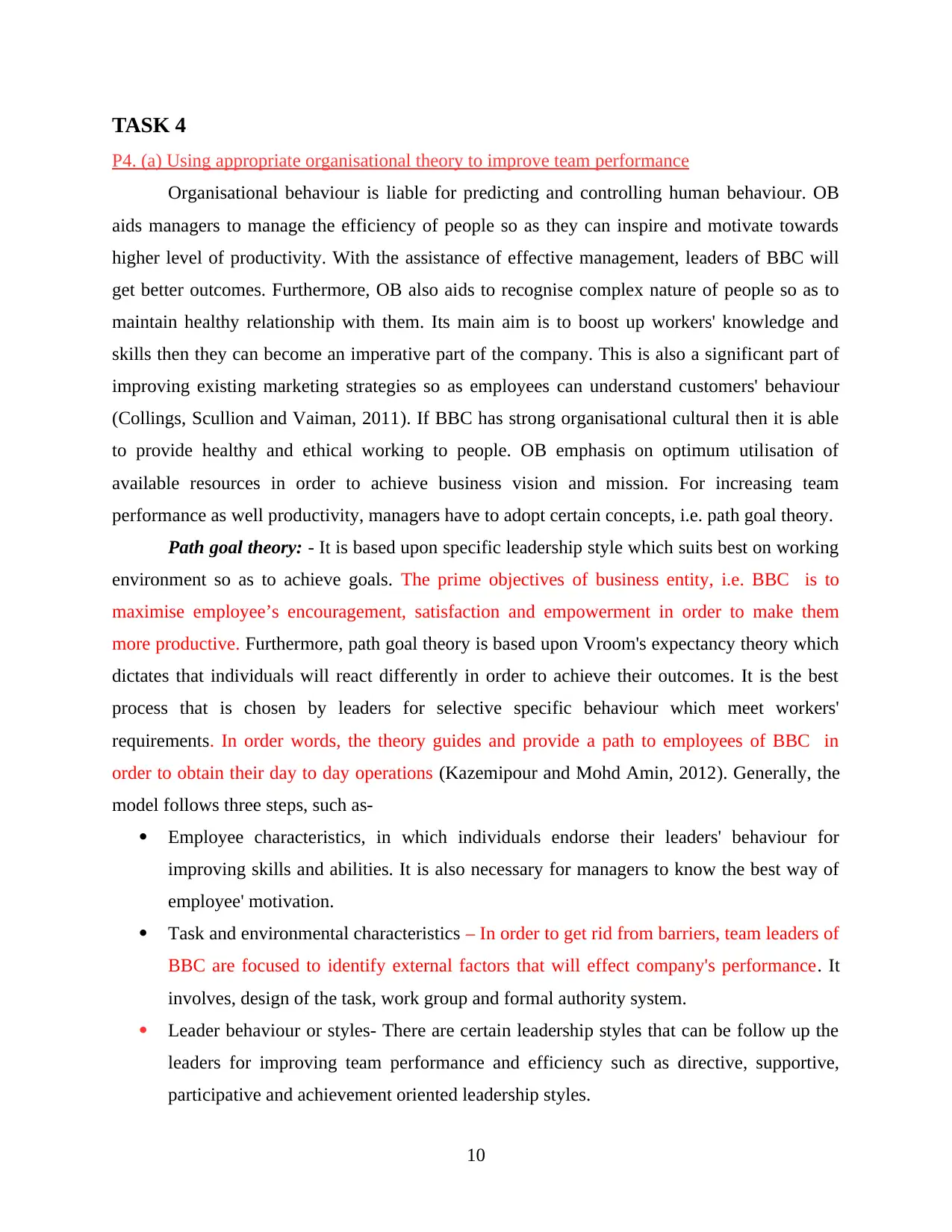
TASK 4
P4. (a) Using appropriate organisational theory to improve team performance
Organisational behaviour is liable for predicting and controlling human behaviour. OB
aids managers to manage the efficiency of people so as they can inspire and motivate towards
higher level of productivity. With the assistance of effective management, leaders of BBC will
get better outcomes. Furthermore, OB also aids to recognise complex nature of people so as to
maintain healthy relationship with them. Its main aim is to boost up workers' knowledge and
skills then they can become an imperative part of the company. This is also a significant part of
improving existing marketing strategies so as employees can understand customers' behaviour
(Collings, Scullion and Vaiman, 2011). If BBC has strong organisational cultural then it is able
to provide healthy and ethical working to people. OB emphasis on optimum utilisation of
available resources in order to achieve business vision and mission. For increasing team
performance as well productivity, managers have to adopt certain concepts, i.e. path goal theory.
Path goal theory: - It is based upon specific leadership style which suits best on working
environment so as to achieve goals. The prime objectives of business entity, i.e. BBC is to
maximise employee’s encouragement, satisfaction and empowerment in order to make them
more productive. Furthermore, path goal theory is based upon Vroom's expectancy theory which
dictates that individuals will react differently in order to achieve their outcomes. It is the best
process that is chosen by leaders for selective specific behaviour which meet workers'
requirements. In order words, the theory guides and provide a path to employees of BBC in
order to obtain their day to day operations (Kazemipour and Mohd Amin, 2012). Generally, the
model follows three steps, such as-
Employee characteristics, in which individuals endorse their leaders' behaviour for
improving skills and abilities. It is also necessary for managers to know the best way of
employee' motivation.
Task and environmental characteristics – In order to get rid from barriers, team leaders of
BBC are focused to identify external factors that will effect company's performance. It
involves, design of the task, work group and formal authority system.
Leader behaviour or styles- There are certain leadership styles that can be follow up the
leaders for improving team performance and efficiency such as directive, supportive,
participative and achievement oriented leadership styles.
10
P4. (a) Using appropriate organisational theory to improve team performance
Organisational behaviour is liable for predicting and controlling human behaviour. OB
aids managers to manage the efficiency of people so as they can inspire and motivate towards
higher level of productivity. With the assistance of effective management, leaders of BBC will
get better outcomes. Furthermore, OB also aids to recognise complex nature of people so as to
maintain healthy relationship with them. Its main aim is to boost up workers' knowledge and
skills then they can become an imperative part of the company. This is also a significant part of
improving existing marketing strategies so as employees can understand customers' behaviour
(Collings, Scullion and Vaiman, 2011). If BBC has strong organisational cultural then it is able
to provide healthy and ethical working to people. OB emphasis on optimum utilisation of
available resources in order to achieve business vision and mission. For increasing team
performance as well productivity, managers have to adopt certain concepts, i.e. path goal theory.
Path goal theory: - It is based upon specific leadership style which suits best on working
environment so as to achieve goals. The prime objectives of business entity, i.e. BBC is to
maximise employee’s encouragement, satisfaction and empowerment in order to make them
more productive. Furthermore, path goal theory is based upon Vroom's expectancy theory which
dictates that individuals will react differently in order to achieve their outcomes. It is the best
process that is chosen by leaders for selective specific behaviour which meet workers'
requirements. In order words, the theory guides and provide a path to employees of BBC in
order to obtain their day to day operations (Kazemipour and Mohd Amin, 2012). Generally, the
model follows three steps, such as-
Employee characteristics, in which individuals endorse their leaders' behaviour for
improving skills and abilities. It is also necessary for managers to know the best way of
employee' motivation.
Task and environmental characteristics – In order to get rid from barriers, team leaders of
BBC are focused to identify external factors that will effect company's performance. It
involves, design of the task, work group and formal authority system.
Leader behaviour or styles- There are certain leadership styles that can be follow up the
leaders for improving team performance and efficiency such as directive, supportive,
participative and achievement oriented leadership styles.
10
⊘ This is a preview!⊘
Do you want full access?
Subscribe today to unlock all pages.

Trusted by 1+ million students worldwide
1 out of 16
Related Documents
Your All-in-One AI-Powered Toolkit for Academic Success.
+13062052269
info@desklib.com
Available 24*7 on WhatsApp / Email
![[object Object]](/_next/static/media/star-bottom.7253800d.svg)
Unlock your academic potential
Copyright © 2020–2026 A2Z Services. All Rights Reserved. Developed and managed by ZUCOL.





